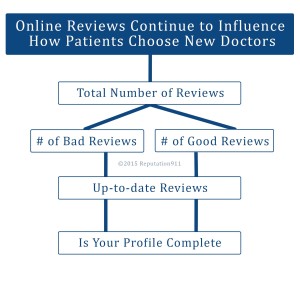How Managing Online Reviews Can Strengthen a Doctor’s Reputation
 These days we use the internet in hopes to improve just about all aspects of our everyday lives. We search for the best car to buy so we can drive to work or go out and entertain ourselves at the mall or the movies. We determine which movies are worth seeing by checking out their ratings online. We look up where to find the biggest and best burger for dinner before we head to the movies, and now, we’re even researching which doctors to see after we’ve had a few too many of those burgers.
These days we use the internet in hopes to improve just about all aspects of our everyday lives. We search for the best car to buy so we can drive to work or go out and entertain ourselves at the mall or the movies. We determine which movies are worth seeing by checking out their ratings online. We look up where to find the biggest and best burger for dinner before we head to the movies, and now, we’re even researching which doctors to see after we’ve had a few too many of those burgers.
Online review sites have become the first stop for many patients when considering a new doctor. Sites like Healthgrades, RateMDs, and Vitals are rising in popularity, giving patients a platform to speak their minds and share their experiences with other patients.
New patients head to these sites to find the best doctors out there to match their needs. Patients are looking for all sorts of qualities in doctors including their trustworthiness, ability to listen and offer clear explanations, wait time, ease of scheduling and much more.
If you are a doctor, it is definitely in your best interest to get involved in these online review sites and work to maintain a strong, positive online reputation. The reputation you create for yourself online will largely reflect your offline reputation and help introduce you to new potential patients.
Here are some of the most important aspects of online doctor reviews that influence a patient’s decision to either choose or avoid a new doctor:
- # of Reviews
- Why isn’t there any information about this doctor out there? Are people going to this doctor? Why is no one saying anything about him or her? Is it because their practice is mediocre? These are some of the questions patients may ask when they don’t see a lot activity on your review page.Usually around ten or more reviews are enough for a patient to get a feel for whether the doctor could be a good fit.
- # Of Bad Reviews (1 Star Ratings)
- Worse than having no reviews at all is having low scoring reviews showing the discontent of your patients. A patient will appreciate good reviews and may consider your service because of them, but the bad reviews are what will stand out and cause a patient to avoid you at all costs.Comfort and trust play a major role in establishing a doctor-patient relationship and if a patient sees a high level of negativity on your profile, they will likely reconsider.
- Up-to-date Reviews
- It is important for your reviews to be up-to-date and refer to recent patient experiences. The Healthcare industry is always changing, so it’s important to stay updated. Reviews will begin to lose relevance and credibility after about 12 months or so.Without recent activity, people may begin to wonder if something has gone wrong or if patients have begun selecting better, more qualified doctors over your service.
- Having a complete profile
- Because review sites are often a patients first encounter with your practice, you want to give them as much valuable information as possible. Make sure to complete all aspects of your online profile including experience, certifications, education, specialties, location and contact information. If a patient is interested in inquiring about your services, this will make it easier for them to do so.Providing easy access to a complete, clear outline of your credentials can have a major impact on a patient’s decision to select you as their new doctor.
The Reputation911 team understands that Doctors and their practice/marketing managers are busy with plenty of other tasks and usually do not have the time to work on suppressing or removing bad doctor reviews. We can help with each of the scenarios mentioned above, while increasing the visibility of your practice. In essence, Reputation911 will not only build or repair the reputation of your practice, we will also make others aware of your positive reputation.